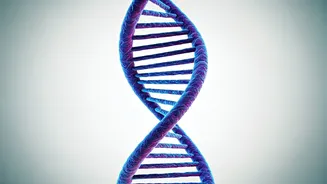Genetic Testing Explained
Genetic testing, in essence, analyzes your DNA to identify any inherited genetic mutations that could increase your risk of developing cancer. This testing is not
a crystal ball, but rather a tool providing insights into your predisposition. It helps determine if you carry specific gene changes linked to a higher chance of certain cancers. These tests typically involve a blood or saliva sample, and the results are then interpreted by a healthcare professional. Several genes are commonly analyzed, including BRCA1 and BRCA2, associated with breast and ovarian cancers. Other genes related to conditions such as Lynch syndrome (colorectal and endometrial cancers) may also be evaluated. The tests aren't designed to diagnose cancer itself, but rather assess your likelihood of developing it. Understanding your genetic risks empowers you to make informed decisions about your health, including preventative measures and early detection strategies.
Who Should Consider?
Deciding if genetic testing is right for you involves considering several factors, including your family history. If you have a close relative with a history of cancer, particularly at a young age, genetic testing might be recommended. This is especially true if there's a pattern of the same type of cancer, or multiple cancers, within your family. Besides family history, certain ethnicities also have a higher prevalence of specific genetic mutations. For instance, individuals of Ashkenazi Jewish descent have a higher chance of carrying BRCA1 and BRCA2 mutations. In cases like these, genetic testing might offer valuable insights. Moreover, your personal medical history, such as a prior cancer diagnosis, can also be a key factor. Consulting with a healthcare provider, specifically a genetic counselor, is crucial. They can assess your individual risk factors, explain the potential benefits and limitations of genetic testing, and guide you in making an informed decision. They'll also help you understand your results and develop a personalized plan of action.
Types of Tests
Several types of genetic tests are available, each offering a different scope of information. Panel testing, which assesses multiple genes associated with a specific cancer type or set of cancers, is a common option. These panels focus on genes known to be linked to particular cancers, such as breast or colon cancer. Another option is a multi-gene panel, which looks at a broader set of genes to determine the overall cancer risk. For individuals with a known family history of a specific genetic mutation, targeted testing may be conducted. This approach checks specifically for the mutation identified in a family member. It offers a precise assessment of whether an individual has inherited the same mutation. When choosing a genetic test, cost is also a factor. The cost varies significantly depending on the type of test, the number of genes tested, and the testing laboratory. It's also important to consider the turnaround time of the tests, as results can take a few weeks to be generated. Consulting with your healthcare provider will help you choose the most appropriate testing type, taking into account factors like your family history, your personal medical history, and your budget.
Interpreting Your Results
Understanding your genetic test results is a critical step in the process. The results typically fall into one of a few categories: positive, negative, or variant of uncertain significance (VUS). A positive result means that a pathogenic or likely pathogenic variant has been detected in a gene, which increases the risk of cancer. In this case, your doctor will discuss your options, which could include increased screening, preventative medications, or risk-reducing surgery. A negative result means that no pathogenic variants were found. This does not eliminate your risk of cancer, as your risk depends on factors beyond genetics. However, it can significantly ease concerns. The VUS results are the most complex. It means a genetic change was found, but the significance isn't well understood, as it’s uncertain whether it increases your cancer risk. You may need more tests, or additional information to interpret such a result. A genetic counselor can provide detailed explanations, helping you to understand your results and navigate your options.
Proactive Steps
Knowing your genetic risk is not an end; it's a beginning. The results provide an opportunity for proactive steps to manage your health. For individuals with increased risk, increased screening is often recommended. This could involve more frequent mammograms, colonoscopies, or other tests, depending on the specific genes involved and the types of cancers they're associated with. Regular check-ups with your healthcare provider will ensure that any signs of cancer are detected early. Another important measure is lifestyle changes. Adopting a healthy lifestyle, including a balanced diet, regular exercise, and avoiding smoking, can reduce cancer risk. Your genetic testing results can also help you make informed decisions about preventive measures. This could involve medications that help lower the risk of cancer. In some cases, preventative surgeries like a mastectomy or oophorectomy can significantly reduce the risk of certain cancers. These decisions need careful consideration and discussion with your doctor and a genetic counselor.
Ongoing Research
The field of genetic testing for cancer is constantly evolving, with ongoing research that is pushing boundaries. Researchers are continually discovering new genes linked to cancer risk and refining testing methods. The goal is to provide a more accurate assessment of an individual’s risk. Advances in technology are also playing a significant role. Next-generation sequencing is improving the speed and accuracy of genetic testing, making it more accessible and affordable. This enables scientists to analyze more genes in a single test, offering a comprehensive view of an individual's cancer risk. This research aims to develop more effective cancer treatments, and personalized prevention strategies. Research is also focused on the ethical and social implications of genetic testing, including patient privacy, and access to testing. Staying updated on the latest research developments is essential for both healthcare professionals and individuals interested in taking proactive steps for their health.














